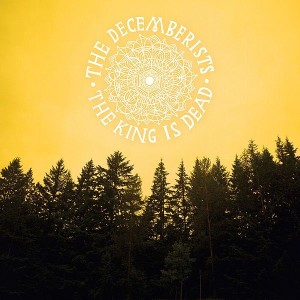 One truism of the record-reviewing business is that the final track on an album often forecasts an artist’s next step. When The Decemberists released The King Is Dead in early 2011, it was immediately apparent that this album followed that rule. In a major side-step, the Portland, Oregon, rockers previously obsessed with English folk-rock followed the direction set on “The Drowned,” the final track of The Hazards of Love and delivered a mostly acoustic alt-country record.
One truism of the record-reviewing business is that the final track on an album often forecasts an artist’s next step. When The Decemberists released The King Is Dead in early 2011, it was immediately apparent that this album followed that rule. In a major side-step, the Portland, Oregon, rockers previously obsessed with English folk-rock followed the direction set on “The Drowned,” the final track of The Hazards of Love and delivered a mostly acoustic alt-country record.
Well, alt-country as channeled through the prism of the 1980s college-rock of early R.E.M., with an occasional excursion into anglophilia. Retired R.E.M. guitarist Peter Buck, in fact, is one of several guest contributors. Also on board are Gillian Welch and David Rawlings with vocals and Annalisa Tornfelt (of side-project Black Prairie) on fiddle.
The King Is Dead is the highest-charting and best-selling Decemberists album so far. And shortly into their 2011 tour in support of the album, the group announced that following the tour it would be going on hiatus as members pursue other projects.
“Here we come to a turning of the season,” frontman and songwriter Colin Meloy sings in the first words of the opening track, “Don’t Carry It All.” “Let the yoke fall from our shoulders / Don’t carry it all, don’t carry it all,” he and Welch sing in the chorus, which can certainly be interpreted as a plea to his bandmates to feel free to step back from the pressure of being one of the most popular indie bands in the country. And yes, I still consider them “indie” even though they’re on a major label.
It is in many ways a contemplative album. The paired songs “January Hymn” and “June Hymn” both revel in pastoral language, as do most of the songs when examined closely. Even the rocking “Down By The Water,” which seems to be a tribute to the band’s home town, is laden with the kind of archaic verbiage that Meloy has always favored: “The season rubs me wrong,” goes the soaring chorus; “The summer swells anon.” The song’s exuberance and drive save that kind of wordplay from seeming too precious. The likewise rocking “This Is Why We Fight” is fully orchestrated with all the trappings of rock including Hammond B-3 organ, but the lyrics are minimalist, its stanzas of three or four syllables. The words on the surface are about literal war: “And when we die / we will die / with our arms unbound.” But they could just as easily be about artistic integrity.
The promised throwback to English folk-rock comes in “Rox In The Box,” which draws heavily on “Raggle-Taggle Gypsy” for its melody. Throughout, the music is rooted, earthy, with lots of pedal steel, mandolin, accordion, octave guitar, harmonica and lots of acoustic guitars.
Perhaps the most upbeat of the lot is “Calamity Song,” which came with this terrific video.
Tucker Martine, one of the most sensitive musician-cum-producers in a town that’s teeming with them, co-produced The King Is Dead along with the band. It was recorded in one of the small performance and workshop spaces at Pendarvis Farm in suburban Portland’s Happy Valley district, site of the annual Pickathon roots music festival.
The Decemberists are one of the most amazingly talented and creative bands to come out of the artistic hotbed of Portland in the past decade. The King Is Dead is a more intimate and song-oriented release than their previous couple of outings, and it succeeds on its own terms. I’m curious to see what Meloy, keyboardist Jenny Conlee, bassist Nate Query, drummer John Moen and guitarist Chris Funk do on their separate projects in the coming months and years, and whether they’ll all get back together some day.
(Capitol, 2011)
